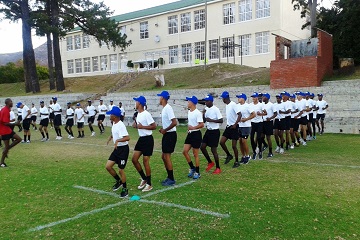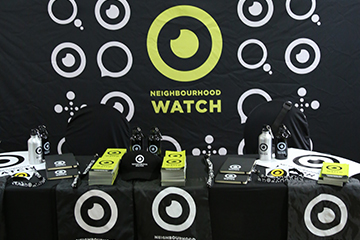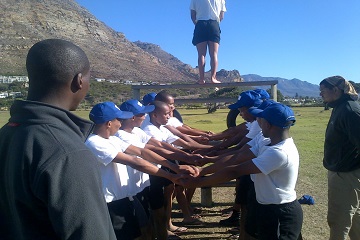Gangsterism in the Western Cape
 The safety of our communities is important to all of us. Crime and violence associated with gangsterism have plagued our communities for years. This is why we’ve put a number of safety initiatives in place to help keep our children and communities safe and combat gangsterism.
The safety of our communities is important to all of us. Crime and violence associated with gangsterism have plagued our communities for years. This is why we’ve put a number of safety initiatives in place to help keep our children and communities safe and combat gangsterism.
Criminal gangs are usually involved with organised unlawful activities. Although not new to the Western Cape, or South Africa at large, crime and violence directly linked to gangsterism have increased drastically over the last few years.
Gangsterism and the law
The Prevention of Organised Crime Act is in place to combat organised crime, money laundering and criminal gang activity.
This Act interprets a member of a criminal gang as a person who:
- admits to criminal gang membership.
- is identified as a member of a criminal gang by a parent or guardian.
- resides in or frequents a criminal gang’s area and adopts their style of dress, their use of hand signs, language or their tattoos, and associates with known members of a criminal gang.
- has been arrested more than once in the company of identified members of a criminal gang for offences which are consistent with usual criminal gang activity.
- is identified as a member of a criminal gang by physical evidence such as photographs or other documentation.
According to the National Annual Crime Statistics for 2017/18, 83% of all gang-related murders in South Africa took place in the Western Cape. During this period, 808 gang-related murders were in the Western Cape from a total of 973 in South Africa.
 What’s our role in combatting gangsterism?
What’s our role in combatting gangsterism?
Minister of Community Safety, Alan Winde has stated that gangsterism is a whole of society issue because it links to education, health and economic issues. Areas, where gangsterism is rife, have low employment and skills rates and a high instance of school drop-out.
The Department of Community Safety has the following programmes in place:
- Neighbourhood Watch regulation, accreditation and training.
- Support municipal law enforcement and the South African Police Service in an oversight capacity.
- The Western Cape Police Ombudsman tries to enhance police services so that it’s more effective and efficient. They aim to improve relations between the police and the communities by investigating complaints of police inefficiency and/or a breakdown of relations between the police and any community.
- The Chrysalis Academy is a youth development academy in Tokai (Cape Town) for young people between 18-25 from across the Western Cape.
The Department of Social Development has the following programmes to assist communities and youth:
- Child care and protection services
- Crime prevention programmes for youth at risk
- Diversion programmes for youth at risk
- Help when a child has been arrested
- Rehabilitation for children and adults in conflict with the law
- Victim empowerment programme
- Youth development programme
Western Cape Directory of Services for Victims of Crime and Violence
VIDEO: Tackling gangsterism together
Why do young people join gangs?
Although there are risks associated with joining a gang such as exposure to violent crime and the high probability of prison time, young people are still willing to join.
Teenagers and adolescents join gangs for the following reasons:
- There’s a presence of gangs in their community.
- They have gang members in their family.
- There may be a history of sexual and/or physical abuse.
- Growing up in poverty.
- Conflict or instability in their home.
- Absent parents.
- Low self-esteem.
- Overcrowded living conditions.
- Being enticed by the access to money, weapons and drugs.
- A lack of success in some areas of their life, example school.
- They may see gangs as a substitute family.
- Being pressurised by gang members to join.
Signs to look out for
As a parent, teacher or guardian you can look out for the following signs of possible gang involvement or affiliation:
- A change in behaviour or suddenly becoming more secretive and/or aggressive.
- Your child has goods or money that you can’t account for.
- Markings on personal belongings of gang symbols or tattoos of known gang signs.
- Withdrawing from family and long-time friends.
- Your child may start to carry a weapon.
- There may be more physical injuries.
- There may be a tendency to petty crime and they may become in trouble with Police.
 Safeguarding your child
Safeguarding your child
Although there’s no definitive way to ensure that your child isn’t lured into gangsterism, here are some tips to make your child less likely to join a gang:
- Your child should be taught to confide in you or a trusted family member or friend.
- Your home should be a place of love and safety for your child.
- Give your child affection, praise them when appropriate and ensure that they feel important.
- Household chores, within reason, will teach your child responsibility.
- Common courtesy should be taught to them from a young age. Example: sharing, compassion, good manners, empathy, waiting their turn, respect for self, others and the environment.
- Encourage your child to pursue hobbies or interests such as sport, reading, cooking or baking, arts and crafts or to get involved in your religious community.
The role of a parent
According to Social Development’s Children and Families director, Dr Lesley Corrie, the role of parents and families, in terms of the protection of children, is becoming increasingly important. The diversity of family roles and arrangements must also be recognised. Communities can also play an important role in the supervision of minors.
- Ensure that you’re approachable as a parent so that your child can openly discuss their positive and negative experiences with you.
- Lead by example. Report crime, don’t do drugs, respect the rule of law, don’t buy stolen goods.
- Show your child that you don’t condone illegal and criminal behaviour or activities.
- Discuss the issue of gangsterism by using examples of people in the community affiliated with gangs and how their lives are impacted.
- Discourage any gangster language, wearing clothing associated with gang signs or symbols and hand signals.
- Know your child’s friends and families. Establish a good relationship with their teachers. Always know where they are and who they’re with. Get the telephone numbers and addresses of their friends.
- Create firm rules and teach them that actions have consequences.
- Encourage them to perform well academically and that a good education is one of the things that will lay the foundation for successful adulthood.
- Teach your child about peer pressure and how to deal with it. Children must learn how to deal with conflict without resorting to violence and how to solve problems in a positive way.
There’s help available
There are organisations that can help you with a child who’s a member of a gang, at risk of joining or in trouble with the law.
Western Cape Government programmes and services
- After School Game Changer
- Chrysalis Academy
- Thusong Centres
- Cape Access
- MOD Programme
- Year Beyond
- I-CAN PLAY Gaming Centres
- Youth Development Programme
Department of Social Development
You can find a list of the Social Development offices here.
Non-governmental organisations
|
NICRO: |
NICRO remains the only national non-government organisation providing comprehensive crime prevention services across South Africa. | https://www.nicro.org.za/ |
| SANCA (WC): South African National Council on Alcoholism and Drug Dependence |
Their goal is to render substance abuse prevention and treatment services, which are geared towards creating and reinforcing healthy behaviour and lifestyle changes. | http://sancawc.co.za/ |
| FAMSA: Families South Africa | FAMSA Western Cape is a non-profit organisation (NPO) specialising in relationship counselling. We believe that “healthy families create healthy communities” and are the foundation of our society. | http://www.famsawc.org.za/ |


